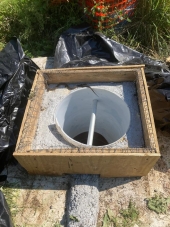Mineral scale in your plumbing system is a function of the background water chemistry which is altered by the pressure, temperature, and chemical changes (e.g. exposure to atmospheric oxygen) at the surface versus in the aquifer. You will see rapid scaling a lot in water heaters where you are rapidly heating "hard" groundwater and precipitating calcium carbonate.
The ozone system that I mentioned in the previous post was installed on a well in the lower Clark Fork River valley of SW Montana. The groundwater had naturally occurring levels of arsenic (80 ppb), iron (2 ppm) and dissolved hydrogen sulfide gas that made it objectionable to use in a house, hence the treatment system. The treatment train consisted of particulate filtration, softener (iron and manganese removal), arsenic removal unit, and ozone treatment for h2s removal. This type of system costs about $3-4K and requires some regular operation and maintenance...and grid power.




